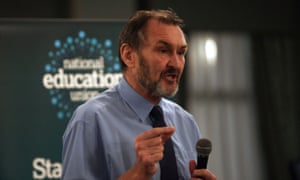
The government has been accused of failing children with special educational needs after a report found funding for pupils had been cut by 17% across England since 2015.
The report by the thinktank IPPR North also revealed the north had been worst affected, with cuts of 22% per pupil. Researchers found government spending on support for children and young people with the most complex special educational needs and disabilities (SEND) had failed to keep pace with rising demand, resulting in a reduction in funds available per pupil.
The report also found that cuts to education and local government budgets had led to a dramatic reduction in support for children with less complex needs and had increased demand for more intensive support.
The current funding settlement for schools and colleges was “nowhere near enough” to provide the support that children and young people with SEND needed and deserved, the researchers said.
Since 2015, government funding through the “high needs block” has increased by 11% across England, but demand has increased by 35%. In the north funding has increased by 8% but the number eligible for support has increased by 39%.
The report’s author, Jack Hunter, pointed to the low employment rates among people with learning disabilities as a sign children with complex needs were not receiving adequate support to prepare them for adulthood.
It comes after more than 1,000 councillors in England wrote to the education secretary, Damian Hinds, urging the government to give schools billions of pounds in extra funding. In the letter, overseen by the National Education Union’s councillor network, councillors urge the government to end spending cuts and increase SEND funding.
IPPR North is calling on government to view support for children and young people with SEND as “an investment in our collective wellbeing and a just economy”.
Hunter said: “The chancellor has declared austerity to be ‘over’, and yet the crisis in funding for schools and colleges is only getting worse. Cuts to overall education budgets have left many without the support they need, particularly in the north, and have driven up demand for intensive SEND provision. Despite emergency government funding announced in December, the current funding settlement is nowhere near enough.
“This is a moral failure but it is also a failure to recognise the economic benefits of upfront investment in young people’s futures. For example, supporting one person with a learning disability into employment could increase their income by between 55% and 95%, and reduce lifetime costs to the taxpayer by at least £170,000.”
Kevin Courtney, the joint general secretary of the National Education Union, said support for children and young people with SEND was “woefully inadequate”.
“Cuts to budgets have meant that support both within schools and local authorities has been drastically reduced, leaving our most vulnerable students without the full support and care they need,” he said. “Parents and carers will not forgive a government that does not believe a fully funded and resourced education system is a priority.”
The children and families minister, Nadhim Zahawi, said: “We have increased high needs funding for children and young people with the most complex SEND from £5bn in 2013 to more than £6bn this year.
“However, we recognise that local authorities have been facing cost pressures on high needs budgets, which is why, in December, we allocated an additional £250m in high needs funding on top of increases we had already promised – £67.7m of this funding has been allocated to local authorities in the north. We have also approved bids for 37 new special schools spread across the country.”
[“source=theguardian”]
 Techosta Where Tech Starts From
Techosta Where Tech Starts From